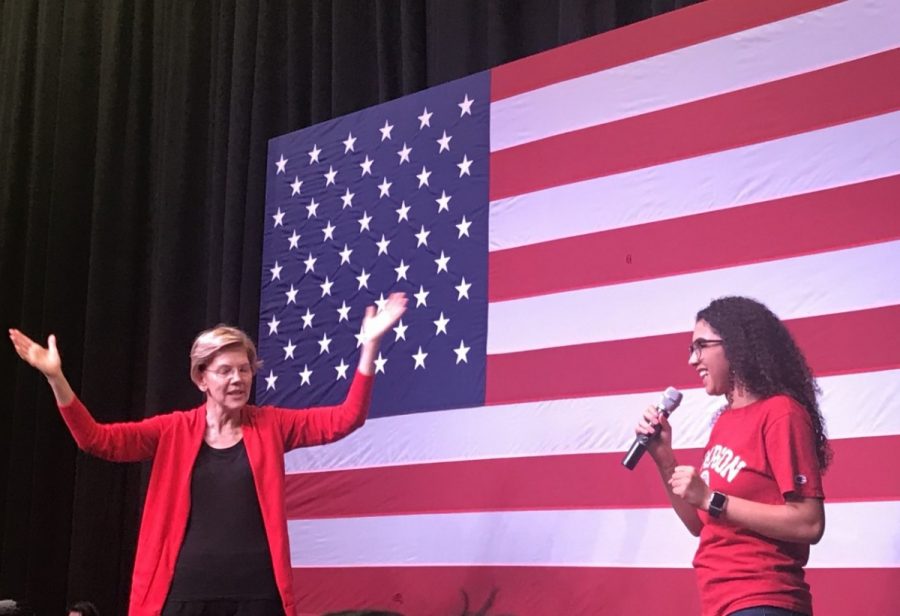Elizabeth Warren speaks at Simpson
Presidential candidate Elizabeth Warren and Student Body President Jailyn Seabrooks share the stage. /photo by Taylor Williams
October 27, 2019
Senator Elizabeth Warren spoke to 475 people in Black Box Theatre on Sunday, Oct. 20.
Warren ran into Black Box Theatre to Dolly Parton’s “9 to 5,” then continued to speak about her fight to end corruption in Washington, creating big structural change in the economy and strengthening American democracy.
Warren is running for the 2020 presidential election and is a front runner for the Democratic party.
Warren was introduced by Student Body President Jailyn Seabrooks and Southern Warren County Field Organizer Ben Horwitz. Both Seabrooks and Horwitz spoke about why they chose to join and support Warren’s campaign.
Horwitz left his life in New York City to come and live in Iowa and work for the campaign.
Warren started her speech by telling the crowd how she got to where she is today.
“The first blessing I ever learned is from my momma is that no matter how hard it looks and no matter how scared you are, when it comes down to it, you reach deep, you find what you have to find, pull it up and you take care of the people you love,” Warren said.
Warren told the crowd her story, a story she said is “the story that millions of people across this country deals with everyday.”
Warren grew up in Oklahoma with three older brothers. At the age of 12 her father who worked multiple jobs suffered from a massive heart attack.
“He pulled through, but he couldn’t work,” Warren said. “I remember when we lost our family station wagon. I remember my mother tucking me in every night. She’d walk out the door, close it, then she’d start to cry. Never in front of me.”
To help save her family home, her mother went out and got a minimum wage job answering phones at Sears.
“A full time minimum wage job took care of a family of three, today it will not keep a momma and a baby out of poverty,” Warren said. “That is wrong and that’s why I’m in this fight.”
Warren said, back then, the question was, “What does it take for a family of three to make it in America?”
“Today it’s where can we set the minimum wage to maximize the profits of giant multinational corporations,” Warren said. “I do not want a government that works for multinational corporations. I want one that works for our families.”
Warren explained her path to this election was a bumpy one. Warren’s parents did not have the funds to send her to college, and even though she received a scholarship to attend school, the journey did not last for long.
“At 19, I fell in love, got married and dropped out of college…yay,” Warren said sarcastically.
Warren eventually went back to school and got a job as a special needs teacher. At the end of her first year there Warren became pregnant and the school hired someone else.
“I got a baby, can’t get a job, I got to do something,” Warren said. “I know. I’ll go to law school.”
Warren enrolled in a state law school for $450 a semester.
“Three years later I was visibly pregnant. You’ll notice there’s a pattern to these stories,” Warren joked.
Warren practiced law for “45 minutes” then went back to teaching.
“I traded little ones for great big ones,” Warren said.
She met her husband Bruce and began teaching students about finances.
“If it was about money I learned about it then turned around and taught about it,” Warren said. “One central question was what’s happening to families across the country? What happened to the middle class.”
Warren answered her own question and tied these issues back to the United States government.
“Government works great for giant drug companies — just not for the people trying to get a prescription filled,” Warren said.
She called this corruption.
“When you see a government that works great for people with money, but not for everyone else, that is corruption and we need to call it out for what it is,” Warren said.
Warren said no matter what brought people to Simpson that day, every issue has been influenced by money.
“If we want to make this country, government, democracy work for us, it’s gonna take big structural change and I’ve got a plan for that,” Warren said.
Warren laid out a three step plan. First, she wants to attack corruption head on.
“Enough of playing on defense, it’s time to go on offense against corruption,” Warren said.
She said she wants to end lobbying, lock the “revolving door between Wall Street and Washington” and make the United States Supreme Court follow basic rules of ethics.
Next, Warren wants to create big structural change in the economy. Some steps in her plan included putting a president in office that will enforce antitrust laws, putting more power in the hands of workers and making it easier to join unions.
Lastly, Warren plans to utilize a wealth tax.
“The first $50 million is free and clear. At the $50 million and one dollar pitch in two cents and two cents on every dollar after,” Warren said.
Warren explained the dissent against her proposed wealth tax and provided that the individuals affected by the wealth tax built their fortune in part off of the employees citizens of America help pay and “at least in part to marketing on roads and bridges we all help pay for.”
Warren said her wealth tax will apply to one-tenth of one-percent (70,000 Americans) of the wealthiest individuals in America.
“Two cents so everyone gets a chance to make it big,” Warren said.
Warren said the revenue from the wealth tax would be used in part to provide universal childcare and pre-k, raise wages, provide universal technical school for two or four year schools, invest in Pell grants and put more money into historically black colleges.
She also said the wealth tax would be used to cancel 95-percent of student loan debt and extend social security.
“Invest in an entire generation,” Warren said. “There it is, I just want three things.”
Warren supporter Robin Martin committed to caucus for Warren on Feb. 3. Martin said she supports Warren because she is smart and articulate.
“I like her ideas and I like the way she’s been presenting them,” Martin said. “I think it’s time we have a woman for president. She’s very group-oriented, she’s partnering and knows how to work across the aisle. She is very wise.”
Warren answered three questions from members of the crowd and spoke on issues including education, childcare, health care, climate change, pollution, her green manufacturing plan, lgbtq+ youth and creating opportunity.
“The way I see it, it’s about opportunity and who gets opportunity in this country,” Warren said. “Opportunity to get a good job, start a business, buy a home. Opportunity to live independently,… an opportunity to love the person you love and build the family you want.”
“Not in a million years did I think I would run for public office, but I got the opportunity to be a public school teacher, the opportunity to be a college professor, the opportunity to be a United States Senator and the opportunity to be a candidate for president of the United States,” Warren said.
Junior political science and history major Jordan Baldwin said he likes that Warren has a plan for everything and how well she spoke to the crowd.
“I thought she spoke well and is great with crowds. Other candidates try to replicate that,” Baldwin said. “I can see why she’s polling so high and what the hype is all about.”
Martin said, “I like that she’s not backing off and she’s not afraid of anything.”
Warren said she has been working on her plans before she decided to run for president.
“I went to Washington and people would say — experts also known as Senators — would say to me that what you’re talking about is too hard, it’s got to many pieces. It’s too complicated. Think generalities,” Warren said. “Smile more, that’s how people run for president.”
“Here’s what I thought about: what do you think naysayers said to the abolitionist? Too hard, give up now. What do you think they said to the suffragettes a little over 100 years ago? It’s too hard, quit now… What did they say to the foot soldiers in the Civil Rights Movement? Too hard, quit now,” Warren said. “But none of them quit. They fought back, they built a grassroot movement. They persisted and they changed the world.”
“This is our moment in American history to dream big. Fight hard and win,” Warren said.

















